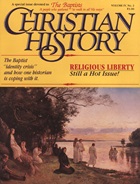Many have trouble defining Baptists and Baptists themselves are not always clear about what they represent. But for James R. Graves there was no ambiguity. Graves was a 19th century author and editor of The Tennessee Baptist.
As Baptists, we are to stand for the supreme authority of the New Testament as our only and suffcient rule of faith and practice. The New Testament, and that alone, as opposed to all human tradition in matters, both of faith and practice, we must claim as containing the distinguishing doctrine of our denomination—a doctrine for which we are called earnestly to contend…
As Baptists, we are to stand for the ordinances of Christ as he enjoined them upon his followers, the same in number, in mode, in order, and in symbolic meaning, unchanged and unchangeable till he come …
As Baptists, we are to stand for a spiritual and regenerated church, and that none shall be received into Christ’s church, or be welcomed to its ordinances, without confessing a personal faith in Christ, and giving credible evidence of piety.
The motto on our banner is:
CHRIST BEFORE THE CHURCH, BLOOD BEFORE WATER …
To protest, and to use all our influence against the recognition, on the part of the Baptists, of human societies as scriptural churches, by affiliation, ministerial or ecclesiastical, or any alliance or co-operation that is susceptible of being apparently or logically construed by our members, or theirs, or the world, into a recognition of their ecclesiastical or ministerial equality with Baptist churches …
To preserve and perpetuate the doctrine of the divine origin and sanctity of the churches of Christ, and the unbroken continuity of Christ’s kingdom, “from the days of John the Baptist until now.” according to the express words of Christ …
To preserve and perpetuate the divine, inalienable, and sole prerogatives of a Christian church—1, to preach the gospel of the Son of God; 2, To select and ordain her own officers; 3, To control absolutely her own ordinances …
To preserve and perpetuate the scriptural design of baptism, and its validity and recognition only when scripturally administered by a gospel church …
To preserve and perpetuate the true design and symbolism of the Lord’s Supper, as a local church ordinance, and for but one purpose—the commemoration of the sacrificial death of Christ—and not as a denominational ordinance, or as an act expressive of our Christian or personal fellowship, and much less of courtesy toward others…
To preserve and perpetuate that primitive fealty and faithfulness to the truth, that shunned not to declare the whole counsel of God, and to teach men to observe all things whatsoever Christ commanded to be believed and obeyed.
Not the belief and advocacy of one or two of these principles, as the marks of the divinely patterned church, but the cordial reception and advocacy of all of them, constitute a full “Old Landmark Baptist.”
Copyright © 1985 by the author or Christianity Today/Christian History magazine.
Click here for reprint information on Christian History.

Support Our Work
Subscribe to CT for less than $4.25/month





























